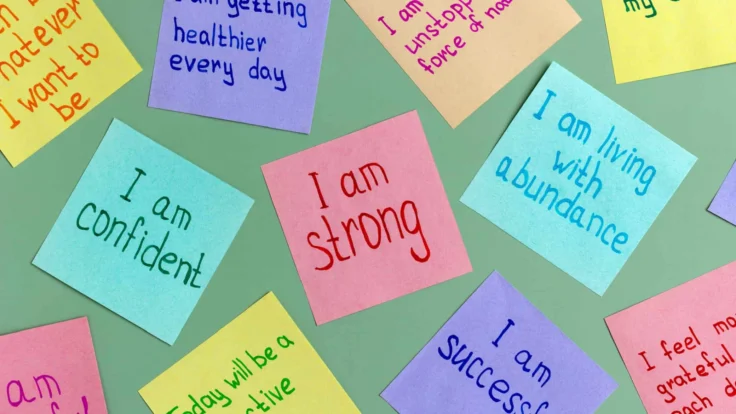When stepping into a job interview, especially as a recent graduate, you might face questions that prompt you to reflect on your personal and professional qualities.
These interview questions are asked to assess your self-awareness and communication skills. Here are some examples you might encounter:
- “Tell me about yourself.”
- “Describe yourself in one word.”
- “Sum up your experience in one sentence.”
- “Cite five adjectives that best describe you.”
- “If you had to choose three words to describe yourself (or five words or ten words), what would they be?”
- “What are your most important traits?”
- “How do other people describe you?”
While these questions may seem simple, they provide a golden opportunity to leave a lasting impression. The words you choose can shape the interviewer’s view of you and play a crucial role in their hiring decision.
But don’t worry! With the right interview preparation, you can tackle these questions with confidence. Check out our tips and dive into our list of 101 dynamic adjectives to help you shine in your next job interview.
What Are Adjectives?
Perhaps you are wondering, what are adjectives, and why do I need them for a job interview?
Well, as you’ve completed the job application process, you likely scoured the job listing for important keywords.
Some were hard skills, and others were soft skills. Some of these soft skills, especially, were the descriptive words we’re considering here.
An adjective is a descriptive word that describes “the qualities or states of being of nouns” or things.
Let’s do a simple exercise. How would you describe yourself? Write down ten words that would give a new acquaintance an understanding of the kind of person you are.
- Perhaps you described your personality with words like adventurous, funny, extroverted, introverted, or happy.
- You might have used words that characterize your relationships with other people, for example, caring, patient, compassionate, understanding, generous, talkative, or quiet.
- Finally, your words might specify the ways in which you work: hard-working, safety-conscious, prompt, punctual, driven, or meticulous.
Now that you understand the nature of these descriptive power words, how can you use them to your advantage in your career? Specifically, how can you leverage your carefully chosen words during a job interview?
To find the answer, let’s discuss why these questions are used in the first place.
Why Do Interviewers Ask You To Describe Yourself?
How did you get to know your friends and family members? By spending time with them. Think back to when you first met someone whom you now consider a close friend. What did you know about them?
Likely, there was a time when you didn’t even know their name. You observed their actions and talked to them, and over time you became friends.
Job interviews lack the luxury of time and observation. Hiring managers need to fill the position quickly, in a matter of days, weeks, or months. Most of the candidates are complete strangers. That means the “getting to know you” process has to be sped up. It is facilitated by interview questions like those at the outset.
In fact, 93% of hiring managers ask the question “Tell me about yourself.” This is one of the most common interview questions, providing candidates with an opportunity to use adjectives to describe themselves and showcase their strengths effectively.
-
💡 Our expert’s insight

Interviewers often ask candidates to describe their past actions and behaviors in previous roles. This approach, known as behavioral interviewing, helps assess how well a candidate might fit into a new work environment by using past behavior as a predictor of future performance.
Much like speed dating, the interviewer needs to quickly gather enough information to make an informed decision about the candidate’s suitability for the role.
Describing Yourself Can Be Tricky
Some people are more comfortable talking about themselves than others are. However you feel about it, though, describing yourself during a job interview can be like walking a tightrope – it’s all about balance. How so?
You want to be honest about yourself, but you need to outline your achievements rather than downgrading your qualities or abilities. You want to impress the interviewer, but you don’t want to seem self-centered or narcissistic.
When discussing yourself, it’s important to strike a balance between highlighting your strengths and acknowledging areas for improvement. No one is perfect, and showing self-awareness demonstrates both honesty and a willingness to grow.
When discussing team accomplishments, be sure to recognize the contributions of others. This highlights your collaborative skills while still allowing you to showcase your individual role.
Additionally, mention areas where you’re actively working to improve. This demonstrates self-awareness and a commitment to growth without overemphasizing your weaknesses.
This balance and the words you should use can shift depending on who you are describing yourself to.
If you’re writing a dating profile, for example, the tone of your biography will be different from the one on your LinkedIn profile. The dynamic will also change depending on the company culture – you may choose lighthearted words for an interview at a company with a relaxed culture, or more serious, traditional words for an interview at a lawyer’s office or a C-level position, for instance.
Your experience in the field can also alter how you describe yourself. If you’ll need on-the-job training, your descriptive words should be humbler. If you have forty years of experience in the field, you can be a bit more forthcoming.
How To Choose the Right Adjectives
How can you choose the best words to describe yourself? Start by asking yourself the following questions:
- What are the words to describe me that best capture my strengths and personality?
- Are these words positive and reflective of my true self?
- What are the words that describe me best in a professional setting?
- What is the company’s culture like?
- What unique skills or experiences do I bring to this role that set me apart from other candidates?
- How would my closest colleagues or supervisors describe my work style and contributions?
- Can I think of specific examples or situations that demonstrate these descriptive words in action?
- What values are most important to me in my work, and how do these translate into descriptive words?
Let’s explore these questions in more detail.
Be honest
There are probably many ways to describe yourself, but is your description of yourself honest?
Just as stretching the truth about your hard and soft skills on your resume can get you into trouble, so it can during an interview. The bottom line is that if what you say isn’t true, it will be noticed eventually.
Be positive
Words like shy, political, or emotional could be taken negatively, depending on the context. Definitely avoid negative descriptors like lazy, self-centered, or money-loving.
Instead of using the words shy or introverted, use words or phrases that highlight positive aspects, such as being an active listener, thinking before speaking, or being meticulous.
Be a good fit
Questions about yourself are designed to help the interviewer determine if you’re a good fit for the role. Focus on what the job requires and use specific examples from your past experiences to support the qualities you mention.
For instance, if you describe yourself as organized, provide an example of how your organizational skills led to positive outcomes.
- Students can reference study habits, academic achievements, or extracurricular activities. For example, a student might say they are inquisitive: “I often pursued additional research beyond course requirements out of curiosity.”
- Recent graduates should highlight skills gained through academic projects, internships, or campus involvement. A graduate might describe themselves as analytical: “I applied data analysis skills learned in class to optimize processes during my summer internship.”
- Experienced candidates should focus on adjectives that reflect their career progression and industry expertise. For instance, being strategic is a valuable trait: “I led a team that increased market share by 15% through a carefully planned expansion initiative.”
Consider the company culture
Some adjectives may be more suited to certain company cultures than they are to others.
- Mindfulness may be more valued in a company that promotes alternative health products or practices.
- Unconventional or critical thinking may be valued at a tech startup. Learn the company’s culture and values, and choose accordingly.
How many of these adjectives should you keep in mind? Generally, having 3 words to describe yourself will suffice.
You can revisit the list below before each job interview to customize your word list to the nature of the job and the culture of the company.
100+ Adjectives That Can Make You Shine
There are many articles touting the “top 10,” “top 20,” or “top 5” words, qualities, or personal traits to include on your resume or to use at your job interview. But adjectives aren’t one size fits all. Those 5, 10, or 20 words may not always work for you or be appropriate for every interview.
Below, we’ve assembled a list of over 100 positive adjectives for you. Think about your own personal traits, the needs of the job to which you are applying, and the culture of the company. Then, you can choose good words to describe yourself that are tailored to your situation.
Work ethic and professionalism
- Honest
- Committed
- Reliable
- Trustworthy
- Accountable
- Responsible
- Diligent
- Ethical
- Loyal
- Hardworking
- Disciplined
- Punctual
- Patient
- Sincere
- Productive
- Capable
- Experienced
Adaptability and problem-solving
- Flexible
- Agile
- Adaptable
- Problem solver
- Resourceful
- Versatile
- Practical
- Dynamic
- Adventurous
- Open-minded
Resilience and persistence
- Resilient
- Persistent
- Tenacious
- Determined
- Courageous
- Brave
- Fearless
Learning and growth
- Teachable
- Quick-study
- Quick-learner
- Curious
- Eager
Attention to detail
- Meticulous
- Detail-oriented
- Focused
- Thoughtful
- Mindful
- Perceptive
Technical and analytical skills
- Technologically competent
- Strategic
- Intelligent
- Tech-savvy
Interpersonal skills
- Empathetic
- Compassionate
- Considerate
- Sociable
- Friendly
- Approachable
- Cooperative
- Courteous
- Charismatic
- Generous
- Emotionally intelligent
Communication skills
- Communicative
- Articulate
- Eloquent
- Thoughtful
- Active listener
- Concise
Leadership and teamwork
- Leader
- Team player
- Collaborative
- Independent
- Autonomous
- Visionary
- Decisive
- Adaptable
- Supportive
Creativity and innovation
- Creative
- Unconventional
- Innovative
- Imaginative
- Artistic
- Ingenuitive
- Intuitive
Attitude and motivation
- Positive
- Driven
- Passionate
- Motivated
- Self-starter
- Goal-oriented
- Energetic
- Enthusiastic
- Optimistic
- Realistic
Additional personal traits
- Organized
- Balanced
- Discreet
- Humble
- Genuine
- Helpful
- Cheerful
- Sensitive
- Sincere
- Easygoing
- Clever
- Witty
- Calm
- Mindful
Did you find accurate, relevant, and positive descriptions of yourself on the list above? Good!
Remember, too, that there are plenty of other admirable qualities not listed here. Maybe you’re skillful, systematic, an excellent team worker, or something else. Create your own unique list.
You can keep it in a notebook or save it on your computer as a quick reference for interview prep and resume building.
Craft Your Personal Narrative with Adjectives
Now that you can answer questions like “tell me 3 adjectives to describe yourself”
or “describe yourself in 5 words”, you’ll need to move on to the next step: Crafting a personal narrative that effectively uses adjectives to highlight your strengths and qualities.
This approach leaves a lasting impression on interviewers. Integrating the right adjectives into your storytelling demonstrates why you’re the best candidate for the job.
Let’s explore how you can build a compelling narrative that captures attention and sets you apart.
Building a cohesive story
- Identify core themes: Start by identifying the core themes or strengths you want to highlight in your interview. These could be leadership, creativity, adaptability, etc. Choose adjectives that align with these themes and consistently reinforce them throughout your narrative.
- Create a personal brand statement: Develop a concise personal brand statement that incorporates key adjectives. For example, “I am a dedicated and innovative project manager with a passion for leading dynamic teams to success.” This statement serves as an anchor for your narrative.
Integrating adjectives into stories
- Use STAR Method: When answering behavioral questions, use the STAR method (Situation, Task, Action, Result) to structure your responses.
- Integrate adjectives naturally within this framework. For instance, describe a challenging situation where your “resilient” nature helped you overcome obstacles and achieve positive results.
- Highlight achievements: Use adjectives to emphasize achievements and the skills that contributed to them. For example, “As a critical thinker, I led a team to develop a new marketing strategy that increased sales by 20%.”
Practicing your delivery
- Rehearse aloud: Practice delivering your stories aloud to ensure that the adjectives flow naturally and enhance your narrative. This will help you sound confident and authentic during the interview.
- Seek feedback: Share your stories with friends or mentors and ask for feedback on how effectively you’re using adjectives. They can provide insights into whether your narrative is engaging and convincing.
Adapting your narrative
- Tailor to the role: Customize your narrative for each interview by selecting adjectives that resonate with the specific role and company culture. This demonstrates that you’ve done your homework and are genuinely interested in the position.
- Be authentic: While it’s important to present yourself positively, ensure that the adjectives you choose accurately reflect who you are. Authenticity builds trust and credibility with interviewers.
In Conclusion
You may be asked to list a number of words to describe yourself in an interview. Thinking about this ahead of time can prevent you from freezing and help you answer the question in the most advantageous way possible.
This list of 100+ words to use in your job interview can give you the inspiration you need.
Do you need even more inspiration? Try our AI-powered resume builder and personalized advice and suggestions.
Related Posts





